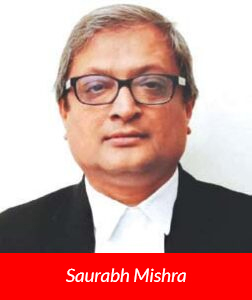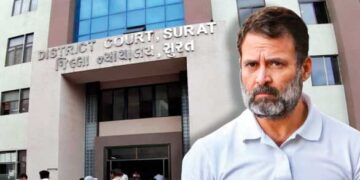 Arecent decision of the court of Chief Judicial Magistrate in Surat, Gujarat, whereby the leader of the Indian National Congress, Rahul Gandhi, has been found guilty of criminal defamation has once again opened the debate on disqualification of legislators and Parliamentarians on being convicted by a Court of law. While the court imposed a modest fine of Rs 15,000, it also imposed the maximum penalty of imprisonment of two years. This conviction led to Rahul Gandhi’s disqualification as a Member of Parliament, highlighting the larger issue of criminal defamation in Indian politics.
Arecent decision of the court of Chief Judicial Magistrate in Surat, Gujarat, whereby the leader of the Indian National Congress, Rahul Gandhi, has been found guilty of criminal defamation has once again opened the debate on disqualification of legislators and Parliamentarians on being convicted by a Court of law. While the court imposed a modest fine of Rs 15,000, it also imposed the maximum penalty of imprisonment of two years. This conviction led to Rahul Gandhi’s disqualification as a Member of Parliament, highlighting the larger issue of criminal defamation in Indian politics.
According to Section 8(3) of the Representation of the People Act, 1951, a person who is convicted of a criminal offence and sentenced to imprisonment for two or more years is disqualified from being a Member of Parliament or a Member of Legislative Assembly. If a higher court grants a stay on the conviction or rules in favour of the convicted lawmaker’s appeal, the disqualification can be overturned. The stay must be a stay of conviction rather than a suspension of punishment pursuant to Section 389 of the Code of Criminal Procedure.
SC landmark judgment
The Lily Thomas case was a landmark judgment passed by the Supreme Court of India in 2013. The case resulted in a change in the disqualification law for convicted MPs or MLAs. Prior to this judgment, lawmakers could continue to hold office even if they were convicted of a crime and sentenced to imprisonment, as long as they filed an appeal within three months of the conviction. The Supreme Court declared this provision of the Representation of People Act unconstitutional, holding that convicted lawmakers cannot continue to hold office even if they have filed an appeal against their conviction.
The court ruled that once a lawmaker is convicted, he or she is disqualified from holding office from the date of the conviction. The Supreme Court, in Lily Thomas vs. Union of India, struck down clause (4) of Section 8 as unconstitutional, thus removing the protection enjoyed by lawmakers.
In recent years, there have been many cases where MPs and MLAs have been convicted of various crimes such as corruption, murder, and rape. As a result, there have been increasing calls for such lawmakers to be disqualified from holding office.
In 2021, the Supreme Court once again clarified the law on the disqualification of MPs and MLAs due to conviction. In a case involving the disqualification of a Maharashtra MLA, the court held that a lawmaker would be disqualified from holding office from the date of the conviction, even if an appeal had been filed against the conviction.
Disqualification automatic
The court also made it clear that the disqualification would be automatic, and that there was no need for a separate order to be passed by the Speaker of the House. This ruling is likely to have a significant impact on the disqualification of convicted lawmakers, as it makes it easier to enforce the disqualification rule.
Recently, a petition has been filed in the Supreme Court challenging the constitutional validity of Section 8(3) of the Representation of the People Act. The plea was filed by Aabha Muralidharan, a PhD scholar and social activist. The petition argues that Section 8(3) is ultra vires of the Constitution as it restricts free speech of an elected Member of Parliament or Member of Legislative Assembly and hinders them from performing their duties for their constituency. Muralidharan suggests that disqualification under Chapter III of the 1951 Act should consider factors such as nature, gravity, role, moral turpitude and the role of the accused. The petition highlights that the legislature intended to disqualify elected members who are convicted of heinous offenses by the courts.
Significant changes
The disqualification law for convicted MPs and MLAs has undergone significant changes, with the Supreme Court clarifying that the disqualification would be automatic and effective from the date of conviction.
Though the disqualification of any elected legislator on the ground of conviction by a court of law may look to be too harsh, however, accountability and responsibility should also be saddled upon such elected representatives because in a representative democracy like India, people look upon their political representatives with respect and awe and such leaders ought to set an example by setting high standards in their public life.














 G20 podium
G20 podium

